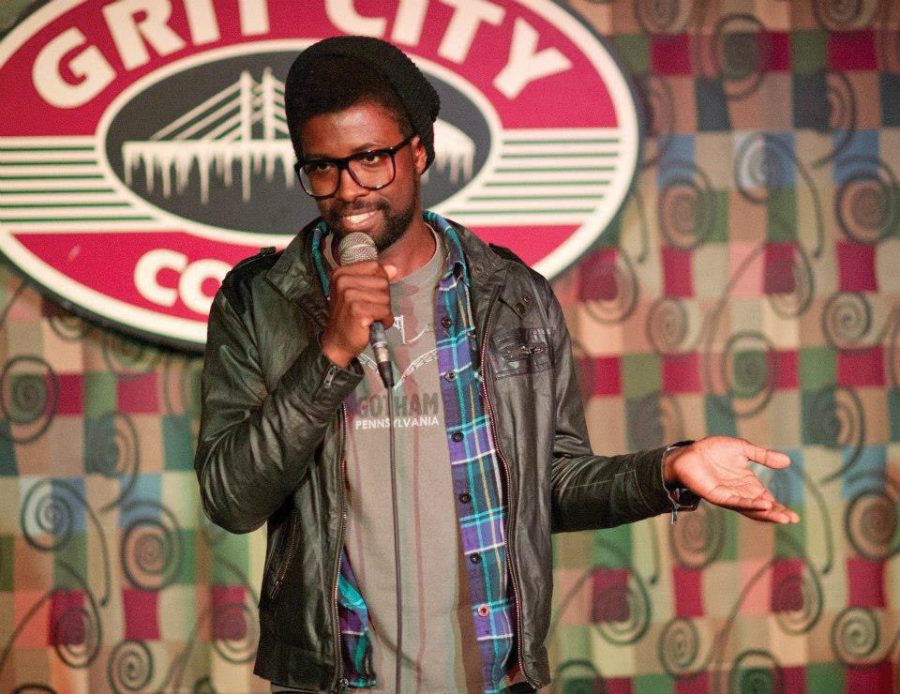Welcome Back: Pittsburgh comedy scene offers diversity, expanding options
August 19, 2014
If you drop by the Monday night open mic at Lava Lounge in Pittsburgh’s South Side, make sure to show up at least 30 minutes late.
When I went to a Lava Lounge open mic last month, I showed up early — sometime around 10 p.m. — just to make sure I didn’t miss anything. But when I arrived, a lone mic stand, tucked away on a stage in the cavernous back room of the bar, was the only sign that a comedic performance was going to take place.
I sat at a booth in the back room, among the lava-themed decor that included magma-flow arches and a glass-plated metamorphic rock disco ball that swung perilously from a thin and short steel chain.
Two comedians danced ironically to pop music while a sound guy prepped the speakers for the show.
“The crowds are usually ass – I mean, it is a Monday,” Davon Magwood, a local comedian who frequents the open mic, said.
But around 10:30 p.m., Pittsburgh’s comedic talent showed up in a big group, complete with a small entourage and a round of freshly poured pints of Yuengling.
The regulars of the open mic took the stage first. Magwood was not present, but many of his colleagues were. The MC introduced each set with short, semi-humorous puns that drew laughs — mostly because his stage presence was good and he laughed hysterically at his own jokes. “You know, man, I feel bad for turtles. Why? Because they’re all defense.” A pause, then a cackle. “You know what I mean? They have no offense!”
Another comedian dryly said, “I don’t shop at Whole Foods, but I guess other people like the idea of spending $20 on carrots.” He added, “Salads there cost the same amount as my student loan payments.”
My night at the Lava Lounge was a good representation of the Pittsburgh comedic scene: a growing coalition of dedicated and funny comics playing to markedly smaller audiences than they would in a bigger city.
But the small crowds can be a positive factor both for fans of comedy and the comedians themselves.
“What I think is cool here [in Pittsburgh] is that there [are] not that many people,” said Pittsburgh-based comedian Andy Picarro. “You can kind of become a fan of somebody and see them again next week. In New York you kind of get lost — there [are] like 70 places [to see comedy].”
Picarro, who just recently moved back to Pittsburgh after almost a decade in New York and New Jersey, also credits the scene’s intimacy with providing longer stage opportunities.
“There is more time available [for comedians as well],” Picarro said. “You’re lucky to get 15 minutes in New York — that’s an amazingly long time in New York. In Pittsburgh you can get 30 minutes — you can get 40 minutes. You can close a show.”
As a Pittsburgh native, Picarro witnessed the growth of Pittsburgh’s burgeoning comedy scene on his frequent trips home to visit family.
“The scene is completely different [from a few years ago],” Picarro said. “There was maybe like three or four mics that were legitimate and running all week, but now there are two mics a night — maybe even three.”
He noted that most of these changes have been driven by the comics themselves.
Magwood agreed with Picarro’s sentiment that local comedians have shown dedication to their craft, and that dedication has gradually produced a reputable comedy scene here in Pittsburgh.
In the past, Magwood said, it was the lack of opportunities that drove comedians to get creative.
“When I started out, I started producing my own shows, and a lot of people started producing their own shows — because they were encouraged to do so,” Magwood said.
This involved putting together shows in basements and playing the role of promoter when none could be found.
Unlike Picarro, Magwood started in Pittsburgh and has flourished here, garnering an appearance on the cover of Pittsburgh City Paper last August and completing two national tours to date. He recently signed a record deal with Rooftop Comedy and a recorded live special is set for Aug. 8 at the Rex Theater in the South Side.
The growing comedy scene has led to more open mics, more local comedy showcases and new comedic venues. Most notably, Arcade Theater, located Downtown on Liberty Avenue, has become a consistent venue to access comedy in the city since its inception in February 2013.
“There’s a lot of fantastic stuff happening in the Pittsburgh comedy scene right now,” said Jethro Nolen, one of the five founders of Arcade.
He sees Arcade as just a part of the “surge” in comic talent and interest.
“We want to be a focal point in that surge,” Nolen said. “We want to be able to attract people who like to watch comedy and also be a place where people who like to do comedy can go to get better and hone their craft.”
Arcade doubles as a venue for local comedy and a training center for aspiring comedians.
“Knowing that comedy is being created locally and cultivated locally is a great thing,” Nolen said.
Though the Pittsburgh comedy scene is still maturing, Nolen remains optimistic that it’s here to stay.
“Pittsburgh is perfectly capable of entertaining itself,” Nolen said.



